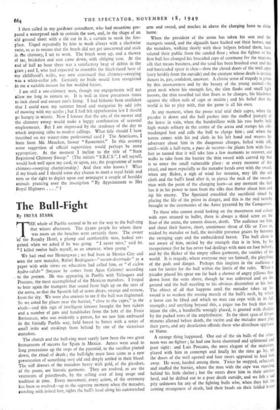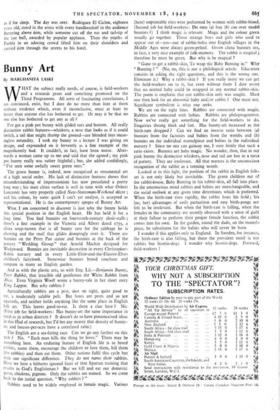The Bull-Fight
By FREYA STARK HE whole of Puebla seemed to be on the way to the bull-ring that winter afternoon. The 23,000 people for whom there was room on the benches were certainly there. The owner of the Royalty Hotel, a plump and comfortable man, looked sur- prised when we asked if he was going. " I never miss," said he. " I killed twelve bulls myself, as an amateur, when young."
We had read our Hemingway ; we had been in Mexico City and seen the new matador, Rafael Rodriguez—" recien-doctcrado" as a paper with wide views on education had called him, or "el ciclon hydro-calido" (because he comes from Agua Caliente) according to the posters. He was appearing in Puebla with Velasquez and Procuna, the most accomplished of the Mexican matadors. I longed to hear again the trumpets that sound from high up on the tiers of the arena, so that the Spanish fall of notes drops, strange and remote, from the sky. We were also anxious to see if the bull was frightened. So we asked for places near the barrier, " close to the capes," in the shade—and this sign of intelligent interest brought the best tickets and a number of pats and handshakes from the host of the Fcniz Restaurant, who was evidently a patron, for we saw him embraced in the friendly Puebla way, held breast to breast with a series of small jerks and strokings from behind by one of the victorious matadors.
The church and the bull-ring must surely have been the two great Instruments of success for Spain in Mexico. Aztecs were used to long processions up the steps of the pyramid, to the sacrifice pinned down, the ritual of death ; the bull-fight must have come as a new presentation of something very old and deeply settled in their blood. The stiff dresses of the matadors heavy with gold, of the picadors, of the peons, are hieratic garments. They arc evolved, as are the vestments of priesthoods, by the rolling over of long usage and tradition in time. Every movement, every action, of the ceremony has been so evolved—up to the supreme moment when the matador, standing with joined feet, sights the bull's head along his outstretched
arm and sword, and reaches in above the charging horn to drive home.
When the president of the arena has taken his seat and the trumpets sound, and the alguazils have backed out their horses, and the matadors, walking slowly with their helpers behind them, have saluted their public from the sanded floor ; when the fighter of the first bull has changed his brocaded cape of ceremony for the magenta silk that means business, and the sand has been brushed over and the red-barricaded space is cleat—then the closed doors of the toril open (very briskly from the outside) and the creature whose death is certain dances in, gay, confident, unaware. A classic sense of tragedy is given by this unawareness and by the beauty of the young animal—the great neck where his strength lies, the slim flanks and small light hooves, the thin tasselled tail that floats as he charges, his blackness against the silken toils of cape or muleta ; and his belief that the world is his to play with, that the game is all his own.
At any moment, when the pcons trial trial their capes, when the picador is down and the bull pushes into the stuffed panoply of the horse in vain, when the banderillero with his two barbs held high stands solitary in the centre of the arena and stamps his silk- stockinged feet and calls the bull to charge him ; and when the torero comes with his red cloth in his left hand and weaves his adversary about him in the dangerous charges, foiled with silk, until—with a half-turn, a paso de recorre—he plants him with fore- feet so turned that it will take him a few moments to recover, and walks to take from the barrier the thin sword with curved tip that is to enter the small vulnerable place: at every moment of this ritual, and most especially as the matador bends over with the sword, when any flicker, a sigh of wind for instance, may lift the red cloth and the bull's head after it, to pierce the neck of the swords- man with the point of the charging horn—at any moment the bull has it in his power to turn from the silks that flutter about him and rip his enemy. The Spaniard ennobled the sacrificial ritual by placing the life of the priest in danger, and this is the real novelty brought to the ceremonies of the Aztec pyramid by the Conquerors.
To those who cannot avoid looking on the movement and colour with eyes attuned to ballet, there is always a third actor on the floor of the arena, the unseen dancer, death. The audience see him, and shout their hoarse, short, unanimous shout of Ole or Toro as, tricked by matador or bull, the invisible presence grazes by between the swinging cape and the embroidered breast. The bull alone is not aware of him, misled by the strength that is in him, by his inexperience (for he has never had dealings with men on foot before), and by the flicker of the empty silken garments, the vanities of his world. It is tragedy, where everyone may see himself, the plaything of the gods and danger. Perhaps this inspires in the audience a care for justice for the bull within the limits of the rules. When a picador placed his spear too far back a shower of angry pillows flew down from the seats above, though he was unhorsed and on the ground and the bull nuzzling to his obvious discomfort at his Ica The object of all that happens until, the matador takes up his sword is to weaken the tossing muscle of the bull's neck, by which a horse can be lifted and which no man can cope with in its full strength ; and anything beyond this, a pique too far back that may injure the ribs, a banderilla wrongly placed, is greeted with disdain by the packed rows of the amphitheatre. In the short span of fifteen minutes allotted before death, the victim and the matador must play their parts, and any dereliction offends those who distribute applause or blame.
A strange thing happened. One out of the six bulls of the after- noon was no fighter ; he had one horn shortened and splintered and poor sight: and Luis Procuna, the most elegant of the matadors, played with him in contempt and finally let the time go by, till the doors of the toril opened and four steers appeared to lead him away. He went, herded among them. Twice he stopped, reluctant, and snuffed the barrier, where the man with the cape was standing behind his little shelter ; but the steers drew him in their aimless herd, and he drifted out to a poor death outside, and we felt a sad pity unknown for any of the fighting bulls who, when they felt the coming strangeness of death, laid their heads on their folded knees
as if for sleep. The day was over. Rodriguez El Ciclon, eighteen years old, stood in the arena with every handkerchief in the audience fluttering above him, while someone cut off the car and tail-tip of the last bull, awarded by popular applause. Then the youths of Puebla in an adoring crowd lifted him on their shoulders and carried him through the streets to his hoteL















































































 Previous page
Previous page